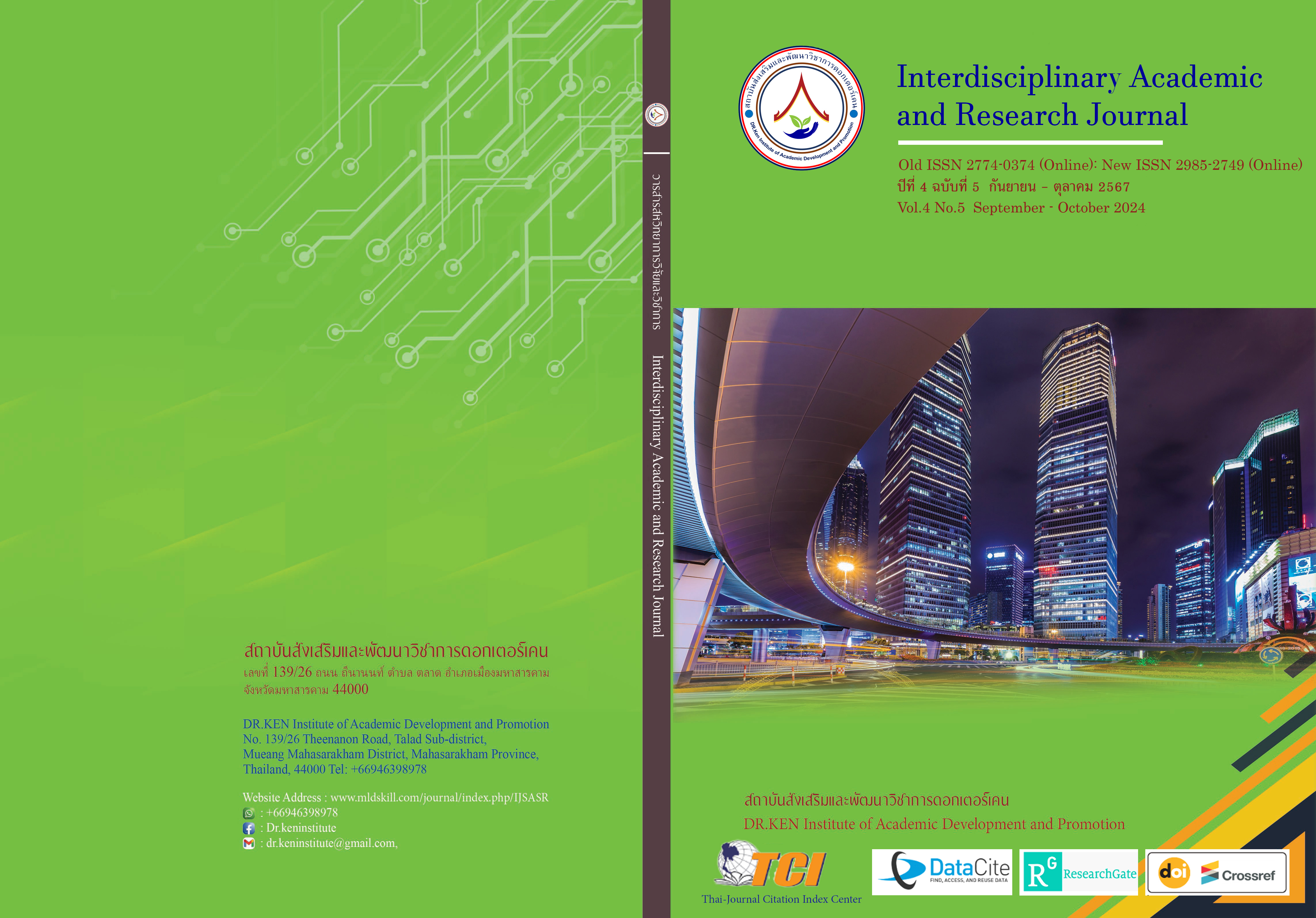Development of Morality and Ethics in Educational Institutions under the Office of the Vocational Education Commission Pathum Thani Province
DOI:
https://doi.org/10.60027/iarj.2024.276788Keywords:
Morality and ethics;, Development of morality and ethics in educational institutionsAbstract
Background and Aims: Developing a nation to compete with advanced countries requires prioritizing human resource development, with education serving as the foundation of this progress. Quality education establishes a sustainable knowledge base, essential for achieving economic, social, and political growth. This study aims to: (1) evaluate the level of moral and ethical development among staff in vocational institutions governed by the Vocational Education Commission in Pathum Thani Province; (2) compare staff perspectives on moral and ethical growth based on variables such as gender, position, and age; and (3) identify effective strategies to enhance moral and ethical standards within these educational institutions in Pathum Thani Province.
Methodology: The sample group for this research included 348 personnel from institutions under the Office of the Vocational Education Commission in Pathum Thani Province during the 2023 academic year, selected via stratified random sampling. Research tools comprised a questionnaire using a 5-point rating scale, which had an Item-Objective Congruence (IOC) value ranging from 0.80 to 1.00, a reliability coefficient of 0.83, and a structured interview. Data analysis utilized statistical methods such as frequency, percentage, mean, and standard deviation, along with t-tests, F-tests, and pairwise comparisons using Scheffe’s method.
Results: The research results indicated that: (1) The overall level of morality and ethics development in educational institutions under the Office of the Vocational Education Commission in Pathum Thani Province was rated high across all dimensions, with consistently high ratings for each specific aspect. (2) Comparative analysis revealed significant differences in morality and ethics development based on gender and position at the 0.05 significance level, but no significant differences were found based on age. (3) Guidelines for enhancing morality and ethics emphasized systematic professional oversight, recognition of outstanding personnel, and structured curricula for moral and ethical growth. The Office of the Vocational Education Commission highlighted merit-based assessments grounded in moral principles, clear standards, and well-defined workloads. Additionally, educational administrators demonstrated effective leadership by modeling rational behavior, prioritizing reason over emotion.
References
กระทรวงศึกษาธิการ. (2551). หลักสูตรการศึกษาขั้นพื้นฐาน พุทธศักราช 2551. กรุงเทพฯ : โรงพิมพ์คุรุสภาลาดพร้าว.
จุรีรัตน์ สิทธิโชค. (2551). แนวทางการพัฒนาคุณธรรมที่พึงประสงค์ของครู สังกัดสำนักงานเขตพื้นที่การศึกษาปทุมธานี เขต 2. วิทยานิพนธ์ บัณฑิตวิทยาลัย มหาวิทยาลัยธุรกิจบัณฑิตย์.
ชัยพร วิชชาวุธ และธีรพร อุวรรณโณ. (2564). พฤติกรรมจริยธรรมในสังคมไทยในปัจจุบันศึกษาตามแนวทางจิตวิทยาสังคม: รายงานการวิจัย. พิมพ์ครั้งที่ 6. กรุงเทพฯ : จุฬาลงกรณ์มหาวิทยาลัย.
เซน ร่มพฤกษ์. (2563). การพัฒนาคุณธรรมจริยธรรมและจรรยาบรรณวิชาชีพของครูในโรงเรียนบ้านนาสารอำเภอบ้านนาสาร จังหวัดสุราษฎร์ธานี. ศึกษาศาสตรมหาบัณฑิต บัณฑิตวิทยาลัย มหาวิทยาลัยราชภัฏสุราษฎร์ธานี. สุราษฎร์ธานี.
ดวงเดือน พันธุมนาวิน และเพ็ญแข ประจนปัจจนึก. (2563). จริยธรรมของเยาชนไทย. กรุงเทพฯ : โรงพิมพ์การศาสนา.
นิพนธ์ ฐานะพันธุ์. (2562). แนวทางการส่งเสริมหลักคุณธรรม จริยธรรม และหลักธรรมาภิบาลในการปฏิบัติงานของบุคลากรองค์กรปกครองส่วนท้องถิ่นจังหวัดพัทลุง. วารสารวไลยอลงกรณ์ปริทัศน์(มนุษยศาสตร์และสังคมศาสตร์), 9(2), 121-129.
บุญชม ศรีสะอาด. (2560). การวิจัยเบื้องต้น. พิมพ์ครั้งที่ 10. กรุงเทพ ฯ : บริษัทสุวีริยาสาส์น.
ปวีณา ทิมทอง. (2562). ผลของโปรแกรมการจัดประสบการณ์ตรงที่มีต่อพฤติกรรมด้านความซื่อสัตย์ของเด็กปัญญาอ่อน. วิทยานิพนธ์ปริญญามหาบัณฑิต มหาวิทยาลัยเชียงใหม่. เชียงใหม่.
พระครูกิตติวราทร (ทองปั้น). (2562). การส่งเสริมคุณธรรม จริยธรรม และธรรมาภิบาลในการปฏิบัติงานของบุคลากร องค์กรปกครองส่วนท้องถิ่น ภาคตะวันออกเฉียงเหนือตอนกลาง. วารสารวิชาการธรรมทรรศน์, 19(2), 1-12.
ภัทร์ หาสาสน์ศรี. (2563). การศึกษาพฤติกรรมด้านคุณธรรมจริยธรรมของครูผู้สอนในโรงเรียนสาธิตมหาวิทยาลัยรามคำแหง. วารสารวิจัยรามคำแหง (มนุษยศาสตร์และสังคมศาสตร์), 23(2), 26–32.
วรัญชิดาธรณ์ พลานิวัติ. (2565). ความพึงพอใจของครูและบุคลากรทางการศึกษาต่อพฤติกรรมคุณธรรมจริยธรรม และการบริหารงานของผู้อำนวยการสำนักงานการศึกษาเอกชนอำเภอ จังหวัดชายแดนใต้. วารสารพิกุล, 20(1), 227-241.
สำนักงานคณะกรรมการการอาชีวศึกษาจังหวัดปทุมธานี. (2566). รายงานการพัฒนาตนเองประจำปีการศึกษา 2565. กรุงเทพฯ : สำนักงานคณะกรรมการการอาชีวศึกษาจังหวัดปทุมธานี.
สุวิชย์ชัย เดชศักดาพร. (2565). คุณธรรมจริยธรรมของผู้บริหารสถานศึกษา สังกัดกรุงเทพมหานคร. สำนักงานวารสาร มจร สังคมศาสตร์ปริทรรศน์, 11(1), 29-42.
อุไรรัตน์ เนาถาวร. (2564). การต่อต้านการทุจริต. กรุงเทพฯ : กระทรวงการท่องเที่ยวและกีฬา.
Krejcie, R. V., & Morgan, D. W. (1970). Determining sample size for research activities. Educational and Psychological Measurement, 30(3), 607–610.
Downloads
Published
How to Cite
Issue
Section
License
Copyright (c) 2024 Interdisciplinary Academic and Research Journal

This work is licensed under a Creative Commons Attribution-NonCommercial-NoDerivatives 4.0 International License.
Copyright on any article in the Interdisciplinary Academic and Research Journal is retained by the author(s) under the under the Creative Commons Attribution-NonCommercial-NoDerivatives 4.0 International License. Permission to use text, content, images, etc. of publication. Any user to read, download, copy, distribute, print, search, or link to the full texts of articles, crawl them for indexing, pass them as data to software, or use them for any other lawful purpose. But do not use it for commercial use or with the intent to benefit any business.
















.png)


